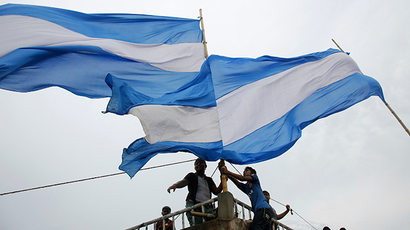Argentina placed into ‘default’ rating as debt deal deadline expires

Argentina’s credit rating was downgraded to “selective default” by Standard & Poor’s as the South American country missed Wednesday’s deadline for a grace period during ongoing negotiations with holdout debt holders.
Wednesday is the cutoff for Argentina to make good on a $539 million payment to bondholders, which was placed on hold by US judge Thomas P. Griesa’s order tying that payment to ongoing litigation by vulture funds which refused the country’s original cents-on-the-dollar debt restructuring offer and purchased the distressed debt from secondary markets.
Analysts generally do not believe that a default by Argentina will have the same consequences as in 2001.
“An Argentina default is expected to be short-lived at this point and shouldn’t have any major implication for the country,” said Mauro Roca to Bloomberg, a senior Latin America economist at Goldman Sachs in New York.
“There’s the expectation that a deal with holdouts will be worked out soon.”
The country’s Economy Minister Axel Kicillof arrived in New York this week to engage in negotiations with holdout creditors. The talks have been overseen by a mediator appointed by the US judge who placed its payment on hold.
Speaking during a press conference on Wednesday evening Kicillof told reporters that the so-called vulture funds had refused a new offer proposed by Argentina.
Kicillof further stated that upon the country's request for a stay to process the existing payment to 90%-plus of bondholders, the judge responded that only the holdout vulture funds could grant that request. The Argentinian minister said that the hedge funds did not comply to a stay.
"We will not sign anything that puts at risk the future of the Argentinian people," said Kicillof. "Argentinians can rest easy. The country will continue forward. But have no doubt that we are open to further dialogue, just as long as it is under reasonable conditions."
Argentine banks had, meanwhile, attempted to put together a
proposal to purchase the debt held by the hedge funds and avert a
default. Highlighting how close a deal may have been, news had
broken in Buenos Aires that a deal had been reached, though
ultimately several sources confirmed to Reuters that it had
collapsed.
The country has been unable to access international financial markets since its massive $100 billion default in 2002, and despite its ability to deal with the so-called Paris Club of creditors, the ongoing litigation by the holdout funds still prevents the country from fully emerging to global credit markets after more than a decade.
"Unfortunately, no agreement was reached and the Republic of Argentina will imminently be in default," Daniel Pollack, the mediator appointed by Judge Griesa, said in a statement on Wednesday.
Kicillof, during an extensive press conference which included questions by reporters, defended Argentina's position, and seemed to blame both the court's lack of impartiality and unreasonable expectations by the vulture funds for the country's inability to pay the majority of its bondholders.
"Argentina paid, it has money, it will continue to pay the next installments because we want to do so and because the money is available," he said.
"This money is there. If it were a default, there would be no money."
As far as Buenos Aires is concerned, any move to capitulate to holdout bondholders would trigger a clause that could leave the country vulnerable to additional claims worth hundreds of billions of dollars who already accepted the restructured debt agreements.














